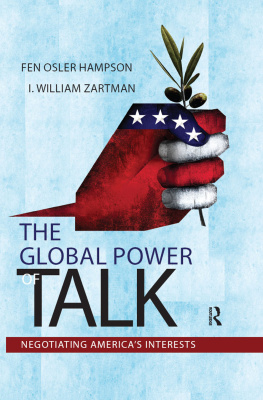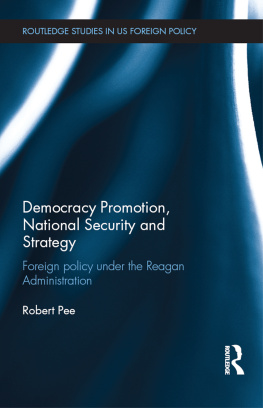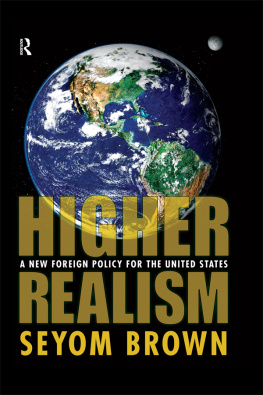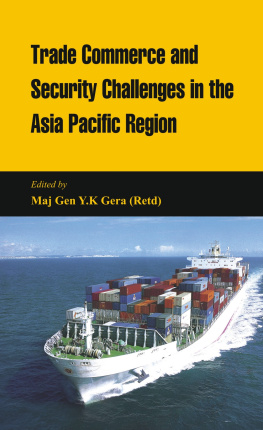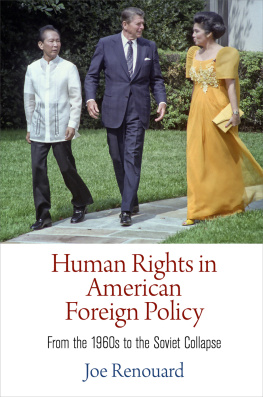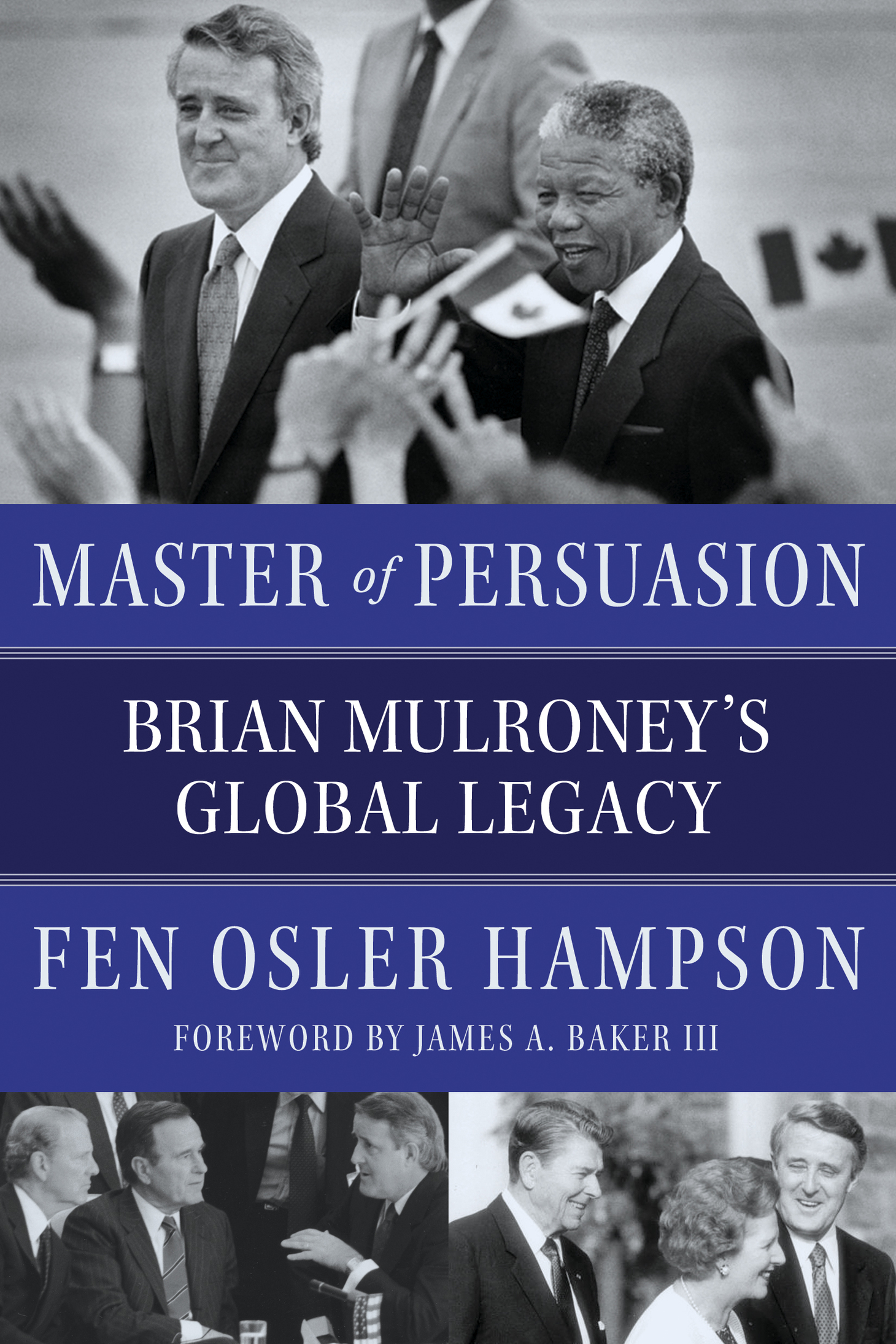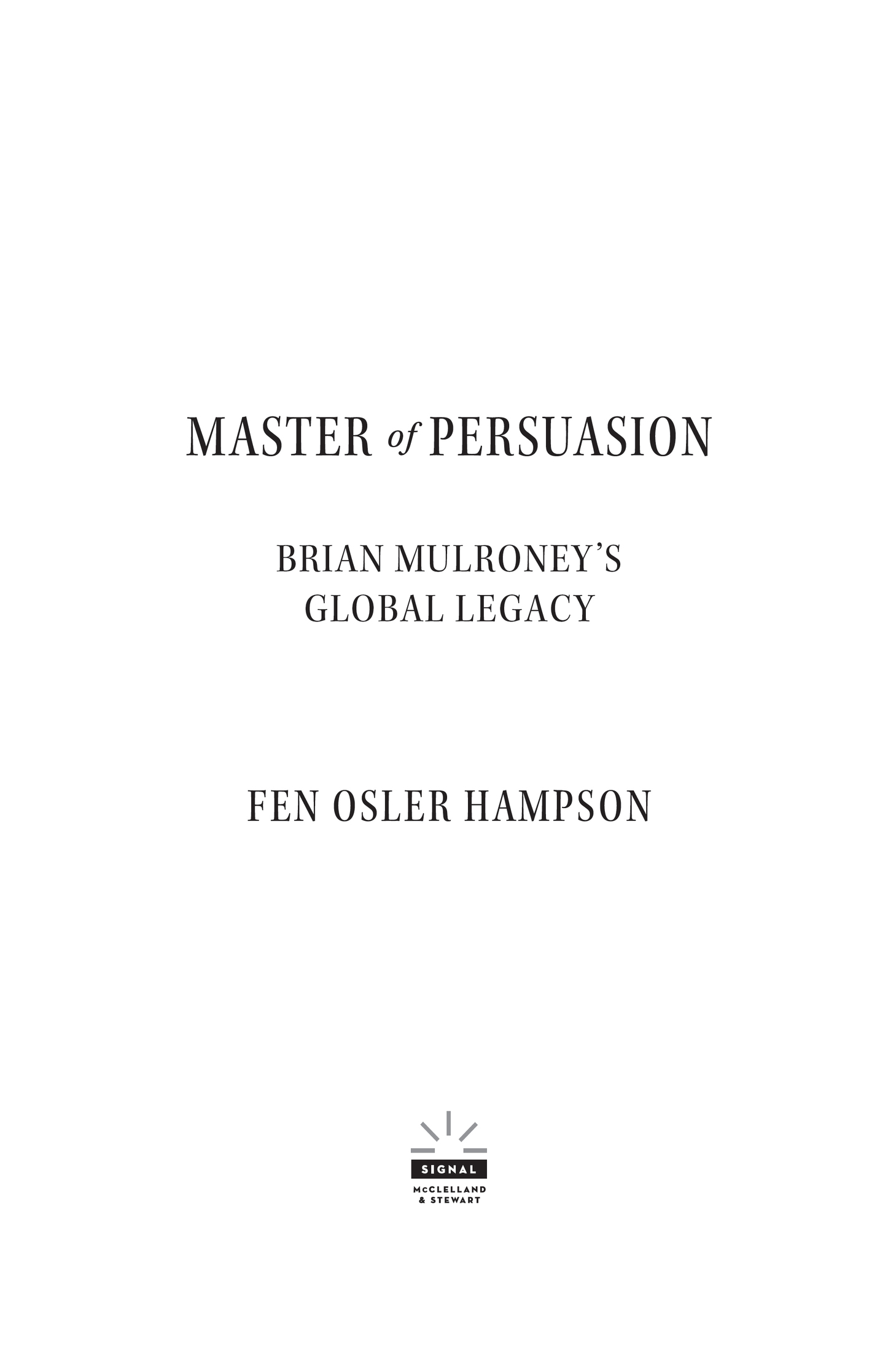Contents
COPYRIGHT 2018 FEN HAMPSON
Hardcover edition published 2018
Signal and colophon are registered trademarks of McClelland & Stewart
All rights reserved. The use of any part of this publication reproduced, transmitted in any form or by any means, electronic, mechanical, photocopying, recording, or otherwise, or stored in a retrieval system, without the prior written consent of the publisheror, in case of photocopying or other reprographic copying, a licence from the Canadian Copyright Licensing Agencyis an infringement of the copyright law.
LIBRARY AND ARCHIVES CANADA CATALOGUING IN PUBLICATION
Hampson, Fen Osler, author
Master of persuasion / Fen Osler Hampson.
Issued in print and electronic formats.
ISBN 9780771039072 (hardcover). ISBN 9780771039089 (EPUB)
1. Mulroney, Brian, 1939- Influence. 2. Prime ministersCanadaBiography. 3. CanadaForeign relations1945-. I. Title.
FC630.H33 2018971.0647C2017-904789-2
C2017-904790-6
Excerpts on from Famine in Ethiopia: Suffering and Grace, by David Lamb, published December 30, 1984, copyright 1984. Los Angeles Times. Used with permission.
Cover images: main The Canadian Press/Wm DeKay; Arthur Milnes/courtesy of the photographer; Hans Deryk/The Globe and Mail
Cover design by Leah Springate
Interior photographs courtesy of the Rt. Hon. Brian Mulroney, Rt. Hon. Brian Mulroney Fonds, Library & Archives Canada
Published simultaneously in the United States of America by Signal, an imprint of McClelland & Stewart, a division of Penguin Random House Canada Limited, a Penguin Random House Company
Library of Congress Control Number is available upon request
Published by Signal,
an imprint of McClelland & Stewart,
a division of Penguin Random House Canada Limited,
a Penguin Random House Company
www.penguinrandomhouse.ca

v5.2
a
For my students
CONTENTS

FOREWORD

By James A. Baker III
U NDER BRIAN MULRONEY S LEADERSHIP CANADA PUNCHED well above its weight on the world stage. The reasons are spelled out in this important book on the foreign policy achievements of Brian Mulroney, which not only describes in rich, compelling detail the many, singular accomplishments of Canadas 18th prime minister, but also explores the reasons behind his success.
As Fen Hampson explains, Brian Mulroney understood that one of the major sources of Canadas global influence rested on building strong and durable ties with the United States and its leaders. That platform lent credibility and leverage to Canadas global engagements, but also showed that Canada could be a major, global player while simultaneously enjoying positive and constructive relations with its southern neighbour. Although Brian Mulroney enjoyed remarkably good personal relations with many world leaders, including German chancellor Helmut Kohl, South African president Nelson Mandela, French president Franois Mitterrand, and Britains prime minister Margaret Thatcher, it must be said that his relations with United States president Ronald Reagan and then-President George Herbert Walker Bush were incomparable in terms of their depth, breadth, and closeness.
Together with Presidents Reagan and then Bush, Mulroney advanced a compelling, new vision for North America that would see the removal of many of the outstanding barriers to trade in goods and services by constructing the worlds biggest and most successful trading bloc, first under the Canada-US Free Trade Agreement ( CUSFTA ) and then under the North American Free Trade Agreement ( NAFTA ) with the addition of Mexico. Their collective vision produced millions of new jobs, spurred billions in cross-border investment, and enhanced prosperity and stability in all three countries. Today, the integrated economies of North America have a combined population of half a billion people and a total GDP that is slightly over $21 trillion USD , which is more than double Chinas GDP.
Despite much of the anti-trade fervour in Washington these days, North America today is a global economic juggernaut. Cooperation among the three NAFTA countries is a source of Americas strength, as are the close community and cultural ties that have developed among our three countries. North America is also one of the most competitive regions in the world. NAFTA helped our three countries succeed in a highly competitive world. However, it is also important to remember that this highly beneficial enterprise began with Mulroneys early overtures to President Reagan for a bilateral free trade agreement and Reagans own immediate enthusiasm for the idea.
Mulroneys friendships with Reagan and Bush were clearly based on warm personal relations, mutual respect, an unwavering commitment to shared political values, and a bedrock of trust. Mulroney was seen by both Presidents as a valuable interlocutor and trusted counsel, often on issues that went well beyond the narrow scope of CanadaUS relations. This was especially true in the run up to the first Gulf War when President Bush built a global coalition with Mulroneys help to expel Iraqi leader Saddam Husseins forces out of Kuwait, which Hussein had illegally invaded. Mulroneys counsel was also helpful as the Berlin Wall came tumbling down and Western allies found themselves divided on the thorny issue of German reunification, which Bush and Mulroney strongly supported. Mulroney had an uncanny grasp of American politics and American politicians which is why his counsel was unfailingly pertinent. He was instrumental in bolstering the trust of other allies on these critical issues. It was truly a momentous time in global affairs and tested the leadership skills of all who were involved.
I was privileged to lead the U.S. team in the final stages of the bilateral free trade negotiation and I believe that the result was one of two major, economic achievements of the Reagan administration; the other being tax reform. At the negotiating table, as I can personally attest, Mulroney was an effective and principled negotiator, as were the members of his team. Although negotiations on trade and acid rain, for example, were sometimes challenging, protracted, and difficult, they never descended into acrimony or bitterness that could have soured relations or poisoned the well for future talks. Mulroney upheld the interests of Canada with a bold vision few would have attempted. But he also understood the importance of securing mutual benefits that would enhance the prosperity and security of North America as a whole. The same is true about Canadas defence and security relations with the United States during Mulroneys tenure: Canada was a reliable security partner that carried its fair share on defence and dutifully deployed its men and women in uniform to help bring peace to the worlds troubled hot spots.
The close partnership Canada had with the United States under Brian Mulroneys leadership was a compelling symbol to the rest of the world during a period of geostrategic upheaval and uncertainty following the break-up of the Soviet Union and the disintegration of the Warsaw Pact. It was a partnership that continues to serve as a model to others about how to conduct relations between neighbours. President Reagan, President Bush, and Prime Minister Mulroney were truly visionary and transformative leaders. They recognized that North Americans had to work together to secure their borders, while simultaneously opening their shared borders to promote jobs and prosperity and to preserve our shared environment.



